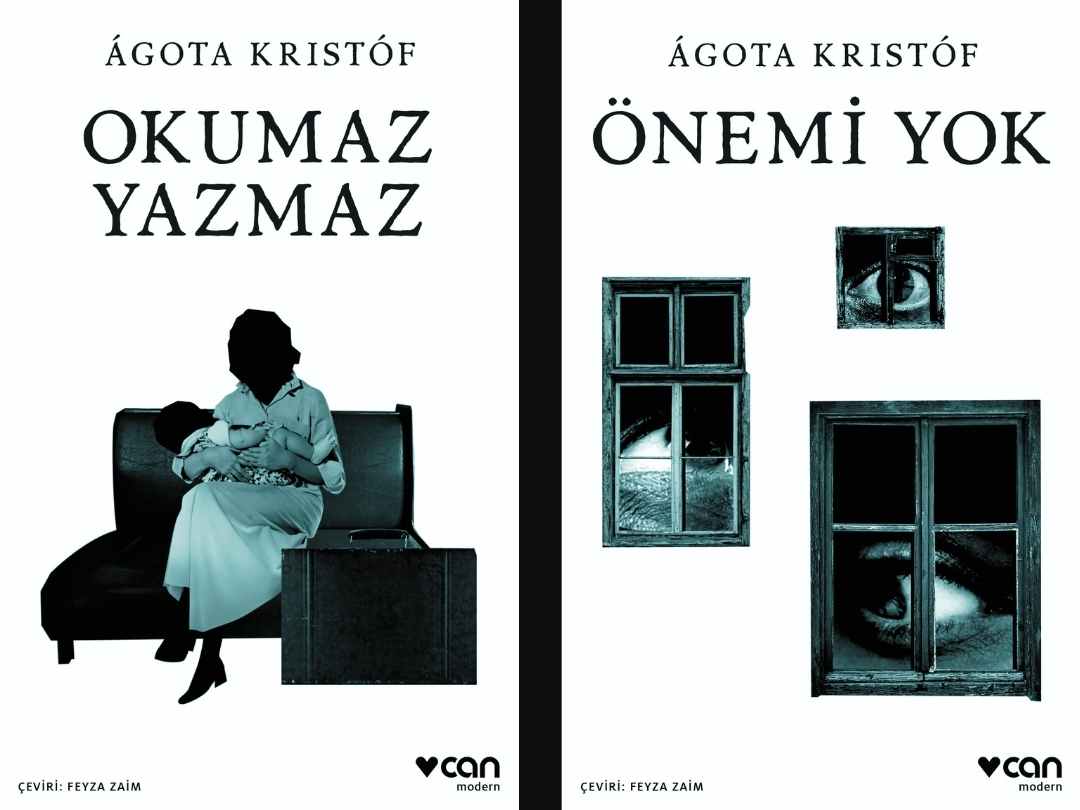Kristóf writes about the devastating effects of war on the individual and society, migration, immigration, orphanhood with the remnants of an indescribable sadness and the most concise words.
I left my scrapbook with my coded writings and my first poems in Hungary. I left my brothers, my parents behind without even a word, without even a goodbye. But most of all on that day, that late November day in 1956, I lost my belonging to a people once and for all.
The first happy years in Hungary, post-war poverty, the boarding school period, the breaking of the “silver thread of childhood”, Stalin’s death, exile, the Lausanne years, a new country, the mother tongue and the enemy language… In Switzerland, where Ágota Kristóf settled as a refugee at the age of twenty-one with her baby and husband, she met a hostile language that she could never fully master, that she could never make her own, that she could neither write nor read. Henceforth, he could no longer feel himself a part of a people, and he always carries the feeling of otherness within himself.
As the author’s only autobiographical text, Okumaz Yazmaz speaks directly to the reader’s heart with its measured, short sentences, neither too many nor too few words.
“This book is a little jewel.”
Kirkus Reviews
“In about fifty pages, Kristóf achieves what others might aim for in an entire career. Sheer genius.”
Max Porter
TITLE
Book Title: Okumaz Yazmaz
Author: Ágota Kristóf
Translation: Feyza Zaim
Publisher: Can Yayınları
Array: Modern
Genre: Narrative
Page Count: 48
Tomorrow I will finally have what I call my home, in a poor neighbourhood of a big city. A poor neighbourhood, because how does one become rich out of nothing, when one is an outsider, when one has never had a home, when one has never wanted to be rich?
A man turns into a statue while hugging his dog for the last time. A woman cannot make sense of her husband falling to his death on an axe on the ground while he was sleeping. A child checks the mailbox twice a day, expecting a letter from the parent who abandoned him as soon as he was born. Another watches his childhood disappear through a train window. The poison of madness, despair, loneliness, homelessness invades every particle of life.
Consisting of twenty-five stories inspired by the author’s dreams and childhood after his forced migration in 1956, Önemi Yok is a strange, disturbing, absurd and touching book.
“Kristóf‘s sentences are skeletal, memories of an ineffable sadness meticulously stripped of blood and skin.”
The New York Times
TITLE
Book Title: Önemi Yok
Author: Ágota Kristóf
Translation: Feyza Zaim
Publisher: Can Yayınları
Array: Modern
Genre: Story
Page Count: 96
ÁGOTA KRISTÓF, born in Hungary in 1935, was forced to flee her country in 1956 with her husband and baby after an anti-Soviet revolution was violently suppressed by the army. She settled in Neuchâtel, Switzerland, where she worked in a watch factory, while learning French and writing theatre plays. The first book of the trilogy of novels he wrote in the language of his country of asylum, Büyük Defter, was followed by Kanıt and Üçüncü Yalan. This trilogy made him recognised. In his books, he focused on the horrors of war and its effects on people, especially children, otherness, immigration, mother tongue and identity. He was honoured with many prestigious awards. He died in 2011 at his home in Switzerland.
FEYZA ZAİM graduated from Notre Dame de Sion French Girls’ High School ’79. She completed her higher education at Istanbul University, Faculty of Literature, Department of French Language and Literature. Some of her major translations are: Nathalie Sarraute’s Altın Meyveler, Robert Pinget’s Fantoine, Agapa Arasında ve Mösyö Songe, Libera, Jean Boisselier’s Buda’nın Bilgeliği. He also wrote a work in Turkish called Aspa-Hana.




